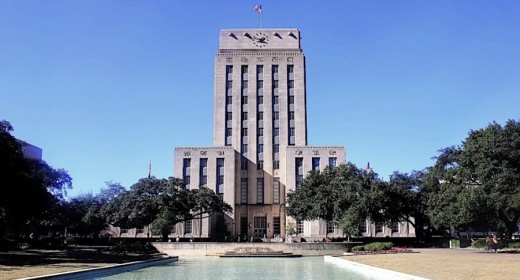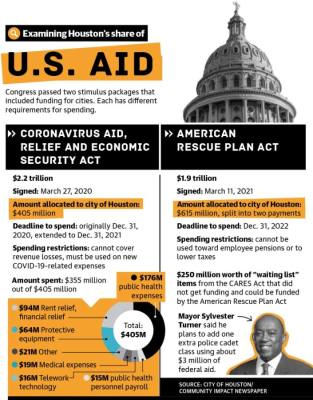The dollars are part of the American Rescue Plan Act, a federal aid package that in part aims to help cities make up for lost revenues from decreased sales, property and other tax revenues impacted by the COVID-19 pandemic.
“The timing of this is very good because we were facing a challenging budget cycle,” Brown said.
The city’s fiscal year begins July 1, preceded by months of preparation among city staff. Around the same time last year, the city received a boost from the Coronavirus Aid, Relief, and Economic Security Act, but the bill prohibited cities from using the funding to fill revenue shortfalls. Instead, local officials were instructed to put the money toward expenses directly related to the COVID-19 pandemic such as testing sites, personal protective equipment, and business and rent relief.
To avoid sweeping furloughs and layoffs that were potentially necessary because of revenue shortfalls, Mayor Sylvester Turner assigned city employees to check temperatures of visitors and fellow employees at city facilities. For every day employees would have been furloughed, they were reassigned to check temperatures instead.
“This time around, there’s a lot more flexibility,” Brown said.
With the new federal aid package signed into law by President Joe Biden on March 11, Turner is permitted to plug holes in the budget. As the end of the fiscal year approaches, the city is expected to face a $150 million gap, the largest in recent history and rivaling the 2008 Great Recession.
Although the new bill has less rigid requirements for how cities can spend funds, the way Houston uses its share could either put it in a better or worse position when it runs out, Brown said. The funds will be disbursed over two years.
If Turner allocates it toward any recurring expenses such as salaries and benefits for new hires, the city will be on the hook for increased spending long after the federal aid runs out, he said.
“We definitely need citywide to add more positions, but the challenge is if we add those, they become recurring expenses every year,” he said.
Although most of the funding is not spoken for yet, Turner told reporters March 14 that he plans to write a sixth cadet class for the Houston Police Department into the next budget, an increase from the typical five classes.
Instead of using the funding on new employees or other recurring expenses, Brown said the dollars would be better spent shoring up liabilities such as the pending Proposition B lawsuit filed by the Houston Firefighters Association. In it, plaintiffs argue because of ongoing pay disputes between the city and the union, firefighters will be owed years of back pay by the time the disagreements are settled. The city has estimated it could owe the department over $100 million by the end of the conflict.
“Now we find ourselves with a large influx of cash. If we could use some of that to help mediate the dispute with the firefighters, we won’t be stuck with a big bill down the road that could financially harm the city,” Brown said.
The growing costs of post-employment health benefits are also burdening the city considerably, Brown said. Setting up a trust with the federal aid to ease the debt would also improve the city’s financial standing, he said.
“I’m excited about having this money and not having to deal with this year’s budget gap, but I’m also understanding that it could potentially delay and even increase the severity of the budget gap by 2024,” Brown said. “It comes down to how you use it.”






